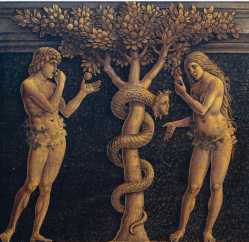[173 / 37 / 48]
Quoted By: >>16832027 >>16832028 >>16832029 >>16832031 >>16832032 >>16832034 >>16832040 >>16832043 >>16832044 >>16832048 >>16832050 >>16832057 >>16832062 >>16832072 >>16832134 >>16832138 >>16832145 >>16832150 >>16832157 >>16832161 >>16832163 >>16832170 >>16834208
The etymology of word "garden" mentioned in the BoG eludes to a theme of ignorant/blissful servitude, maybe even slavery, in the stewarding, butchering, cooking beasts upon the alters. naming and herding beasts one the sea, fields and air, and just so happen to taste good when prepared with great techniques. Also that there may be music involved, and this music had the power to create life, or was a link, or connection to heaven (frenquency/vibration/magnetism/electricity/radiation)...Is the whole of mankind just a slave race: an NPC?
SOME NOTES.
from Old North French gardin "(kitchen) garden; orchard; palace grounds" (Old French jardin, 13c., Modern French jardin), from Vulgar Latin *hortus gardinus "enclosed garden," via Frankish *gardo or some other Germanic source, from Proto-Germanic *gardan- (source also of Old Frisian garda, Old Saxon gardo, Old High German garto, German Garten "a garden," Old English geard, Gothic gards "enclosure"), from PIE root *gher- (1) "to grasp, enclose." Italian giardino, Spanish jardin are from French.
*gher- (1)
Proto-Indo-European root meaning "to grasp, enclose."
It forms all or part of: Asgard; carol; choir; choral; chorale; choric; chorister; chorus; cohort; cortege; court; courteous; courtesan; courtesy; courtier; curtilage; curtsy; garden; garth; gird; girdle; girt; girth; -grad; hangar; Hilda; Hildegard; Hortense; horticulture; jardiniere; kindergarten; Midgard; orchard; Terpsichore; Utgard; yard (n.1) "patch of ground around a house."
Sanskrit ghra- "house;" Albanian garth "hedge;" Greek khortos "pasture;" Phrygian -gordum "town;" Latin hortus "garden;" Old Irish gort "field," Breton garz "enclosure, garden;" Old English gyrdan "to gird," geard "fenced enclosure, garden," German Garten "garden." Lithuanian gardas "pen, enclosure," Old Church Slavonic gradu "town, city," and Russian gorod, -grad "town, city" belong to this group, but linguists dispute whether they are independent developments
SOME NOTES.
from Old North French gardin "(kitchen) garden; orchard; palace grounds" (Old French jardin, 13c., Modern French jardin), from Vulgar Latin *hortus gardinus "enclosed garden," via Frankish *gardo or some other Germanic source, from Proto-Germanic *gardan- (source also of Old Frisian garda, Old Saxon gardo, Old High German garto, German Garten "a garden," Old English geard, Gothic gards "enclosure"), from PIE root *gher- (1) "to grasp, enclose." Italian giardino, Spanish jardin are from French.
*gher- (1)
Proto-Indo-European root meaning "to grasp, enclose."
It forms all or part of: Asgard; carol; choir; choral; chorale; choric; chorister; chorus; cohort; cortege; court; courteous; courtesan; courtesy; courtier; curtilage; curtsy; garden; garth; gird; girdle; girt; girth; -grad; hangar; Hilda; Hildegard; Hortense; horticulture; jardiniere; kindergarten; Midgard; orchard; Terpsichore; Utgard; yard (n.1) "patch of ground around a house."
Sanskrit ghra- "house;" Albanian garth "hedge;" Greek khortos "pasture;" Phrygian -gordum "town;" Latin hortus "garden;" Old Irish gort "field," Breton garz "enclosure, garden;" Old English gyrdan "to gird," geard "fenced enclosure, garden," German Garten "garden." Lithuanian gardas "pen, enclosure," Old Church Slavonic gradu "town, city," and Russian gorod, -grad "town, city" belong to this group, but linguists dispute whether they are independent developments

